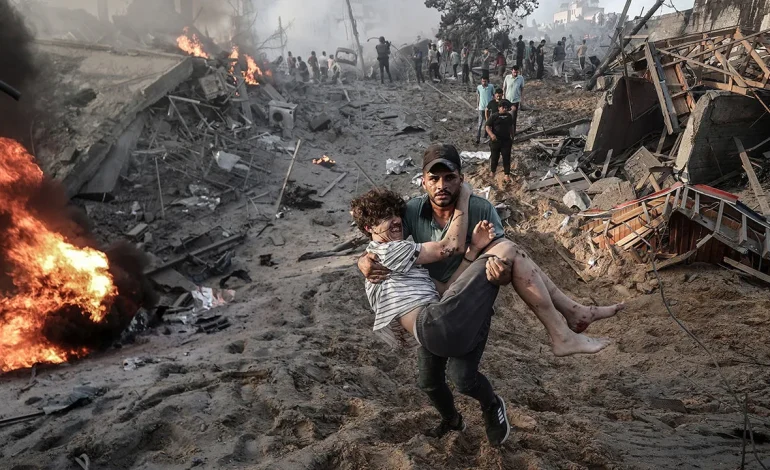It is time to realign our compass with the values that we and this nation stand for and reshape our narrative to leave a heroic and meaningful legacy for future generations. For months, countless children, women and the elderly have lost their lives or [been] severely injured. An immeasurable number of children are now orphans, women have lost their children and spouses and fathers are left without their families. This tragedy will last and harm peace and security in the Middle East for years to come. Additionally, it portrays the free world as hypocritical to those who have suffered under the actions of the Israeli Defense Forces, as their tragedy has been largely overlooked by those who profess to uphold basic human rights. It will take years to assess the damage to our nation’s reputation and even longer to rebuild and regain the people’s trust in the Middle East.
While many view the October 7th tragic event as an act of terrorism, it is seen by those who carried it out as an act of resistance against a longstanding occupation.
While many view the October 7th tragic event as an act of terrorism, it is seen by those who carried it out as an act of resistance against a longstanding occupation. On the other hand, while we must agree that a profound darkness was unleashed that day, the response that followed was both irresponsible and lacked strategic foresight. After that day, Israel had a significant opportunity to improve its image and advance peace efforts in the region through a strategic response. Instead, with support from the West, Israel appears to be positioning itself as the region’s policing force that does all it can to kneel on Palestinians’ necks. Imagine destroying an entire city like Detroit or Chicago just to eliminate criminals and gangs for the sake of a stronger America. Would that be justifiable?
The U.S. administration consistently asserts that it stands with Israel in its right to defend itself. Yet, they remain light on the collective punishment on Gaza and Lebanon, which will ultimately backfire on us and our values. Fawaz Gereges argued in his book, What Really Went Wrong: The West and the Failure of Democracy in the Middle East, that Washington’s short-sighted approach has weakened global security and hindered good governance in the Middle East and beyond. There is no justification for violence as well as collective punishment. Excuses such as the complexity of the conflict, being the only democracy in the Middle East or the right to defend itself will never justify what we have seen in the last year. Only a system of supremacy can justify such actions.
Imagine destroying an entire city like Detroit or Chicago just to eliminate criminals and gangs for the sake of a stronger America. Would that be justifiable?
Ta-Nehisi Coates argues in his book The Message that Israel is the only place in the world supported by the U.S. that reminds him of the world his parents grew up in during the era of Jim Crow laws. In 2007, Israeli Prime Minister Ehud Olmert suggested that without a two-state solution, Israel would face a South African-style struggle. As a result, Coates argues that claiming Israel the only democracy in the Middle East is like claiming America is the oldest democracy in the world—both claims rely on excluding whole swaths of the population (i.e., Blacks and Palestinians).
Are the widespread destruction and daily loss of life honestly acts of self-defense, or are they tactics to dehumanize and humiliate others, irrespective of their age, religion, gender or association with any militant group? Many Americans wonder why individuals in the Middle East harbor negative feelings toward the U.S. government and its institutions despite their admiration for our technological innovations, universities, hospitals and infrastructure. The answer is straightforward: our foreign policy has consistently failed to treat them as human beings.
Many Americans wonder why individuals in the Middle East harbor negative feelings toward the U.S. government and its institutions despite their admiration for our technological innovations, universities, hospitals and infrastructure. The answer is straightforward: our foreign policy has consistently failed to treat them as human beings.
Our foreign policy continues to prioritize strategic interests and domination over fundamental human rights, collaboration and freedom. It is time to stop that and start listening to the people in the Middle East and treating them as equal humans. For decades, people in the Middle East have been denied freedom by the United States and its local authoritarian allies. They have rarely been judged by their achievements or the positive contributions of millions among them. Instead, their very existence is often associated with violence and backwardness, as Fawaz Gerges suggested.
This unfair judgment has been worsened by the fact that American journalism and media have rarely interviewed them to share their views about the conflict. This was noticed last year when the one-sided story was the only story Americans could access through main media such as CNN and Fox News. The historian Maha Nassar, an associate professor of modern Middle East history at Arizona State University, found that less than 2 percent of all opinion pieces discussing Palestinians had Palestinian authors. This imbalance effectively silences the other side, treating it as if it does not exist, is unworthy of attention or less deserving of human consideration. As a result, we push them to be radicals and haters to us.
We have both the responsibility and the opportunity to improve the lives of others while upholding our core values. Too many opportunities have been lost in the pursuit of our interests over our values. Now is the time to show the people of the Middle East that we are not hypocrites, but rather stand firmly behind human rights and against supremacy systems.






Leave a Reply